Neoprene socks have become increasingly popular among water sports enthusiasts and outdoor adventurers. Many people wonder about their waterproof capabilities and how they compare to traditional water-resistant footwear. This comprehensive guide will explore everything you need to know about neoprene socks and their relationship with water.
What Are Neoprene Socks?
Neoprene socks are specialized footwear made from the same material used in wetsuits. These versatile water accessories provide insulation and protection while participating in various water activities. The synthetic rubber material is designed to trap a thin layer of water between your skin and the sock, which your body then warms up, creating an insulating effect.
How Water-Resistant Are They?
While neoprene socks aren't completely waterproof, they offer excellent water resistance. According to experienced paddlers and water sports enthusiasts, these socks provide significant protection from water while keeping your feet warm. They're particularly effective when used in combination with proper water hiking footwear and socks.
Benefits of Neoprene Socks
Neoprene socks offer numerous advantages beyond their water-resistant properties. They provide excellent thermal protection, making them ideal for cold-water activities. Their durability and flexibility make them perfect for various athletic pursuits, from surfing to cycling. The snug fit and protective qualities also help prevent blisters and chafing during extended water activities.
When to Use Neoprene Socks
These specialized socks are ideal for various water-based activities, including surfing, kayaking, and paddleboarding. They're also excellent for beach walks, tidepooling, and any situation where your feet might get wet but you need protection and warmth. For those interested in custom options for specific activities, there are various styles and thicknesses available.
Caring for Neoprene Socks
Proper maintenance is crucial for extending the life of your neoprene socks. Rinse them thoroughly with fresh water after each use, especially after exposure to saltwater. Allow them to dry completely in a shaded area, as direct sunlight can degrade the material. Avoid machine washing or drying, as this can damage the neoprene material.
Wrapping Up
While neoprene socks aren't completely waterproof, they provide excellent water resistance and thermal protection that makes them invaluable for water activities. Their unique properties and versatility make them an essential piece of gear for anyone who spends time in or around water. Understanding their capabilities and limitations will help you make the most of these specialized socks in your water-based adventures.


